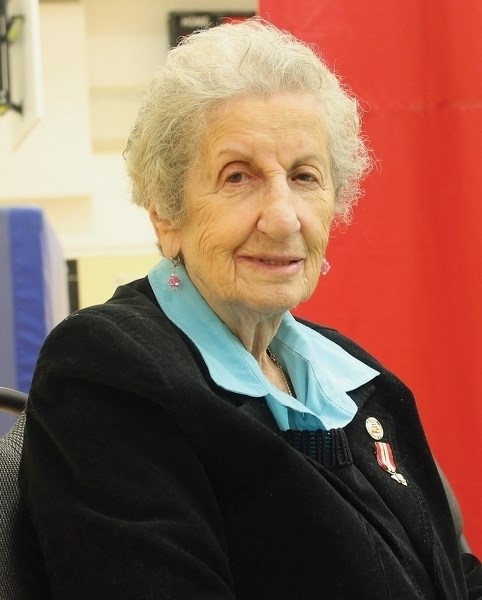It would be easy for Eva Olsson to be full of hate.
Not just because the 90 year old lost her family to the Holocaust, or because her husband was taken from her early in their marriage, or even because she went through parts of her life lacking the power many of us take for granted.
Any one of those things, rightly or wrongly, could give someone a personal justification to reject reason and understanding.
But rather than hate, Olsson used her experiences to deliver a message of tolerance and understanding to an audience of about 100 people at Thorhild Central School on the evening of Sunday, March 22.
“Children that come into schools from a compassionate environment will never be a bully or a bystander,” she said.
“If a child experiences respect, that’s what he’s going to take into school.”
Olsson places her message within her experience. She doesn’t use her life story for sympathy, she uses it to help create a better world for anyone who is willing to listen and be receptive.
Her talk was eloquent, touching, insightful and not without the odd laugh.
Olsson uses humour to break the tension as her talk for adults can be heavy stuff. The observations she makes challenge the audience in many ways and when she gives you the opportunity, don’t be afraid to smile.
Her life story starts in town in Hungry, which due to constantly changing borders, is now part of Romania.
In her early twenties she and her family were sent to a ghetto, from there to Auschwitz-Birkenau and then to other concentration and labour camps.
Along the way her mother, father and other family members were taken from her by a Nazi regime that ended the lives of millions of Jewish people and other minorities during the Second World War.
During her talk, Olsson doesn’t dwell on the atrocities of the Holocaust for shock value, rather she uses it as example of what can happen when people stand by and let bad things happen.
She makes the point of saying that she personally forgives. She can’t offer forgiveness for other people — she acknowledges that’s impossible — but she can find forgiveness within herself.
“You can’t heal if you don’t forgive,” Olsson said.
“Morally and historically I don’t have the right to forgive them for what they did to 11 million people. I can only forgive for what they did to me.
“I made it my mission and a commitment that I will not allow my pain to control my life.”
Her forgiveness is grounded in empathy and understanding. She knows, having seen horrors that are unthinkable to most of us, that the only way to break a cycle of retribution is to gain insight and empathy into why that cycle happens in the first place.
The central focus of a lecture by Olsson revolves around two points.
First, that standing by and doing nothing in the face of discrimination and prejudice enables and validates the perpetrators of those behaviors.
Second, that it’s up to everyone to educate themselves, and others, on how to defeat prejudice and its ugly cousin hate.
“Hate is not something you should use, because hate is not a joke, it’s a killer,” she said.
Olsson spends time addressing the concept of bystanders and bullying and how to defeat it.
To punctuate her messages she uses historical and contemporary examples; like the Dane’s defence of Jews during the Second World War, or the fallout from prejudice in Ontario suburbs.
Hearing how Olsson met her husband, and the beautiful result of acceptance, equality and love of other people, is a high point in a range of emotional moments Olsson offers.
Part of her talk is dedicated to explaining why early parental involvement in the teaching of understanding and empathy is important.
Schools can’t teach kids tolerance and understanding. They can only be part of it. She acknowledges that parents must take the lead on developing well-adjusted and tolerant kids.
“We have a responsibility to our children to send them to school the way we want to see them as adults,” Olsson said.
“The teacher cannot fix them. What teachers do … they supply the tools of education and it’s our responsibility to make sure that our children pick up those tools and use them in the right direction.”
Olsson will undertake a speaking tour of the region in late April, which includes stops at schools in Swan Hills, Westlock and Barrhead.
On Monday, April 27, at 7 p.m. in the theater of Barrhead Composite High School, anyone can see Olsson speak. Tickets are $5 and seating is limited to just under 200.



